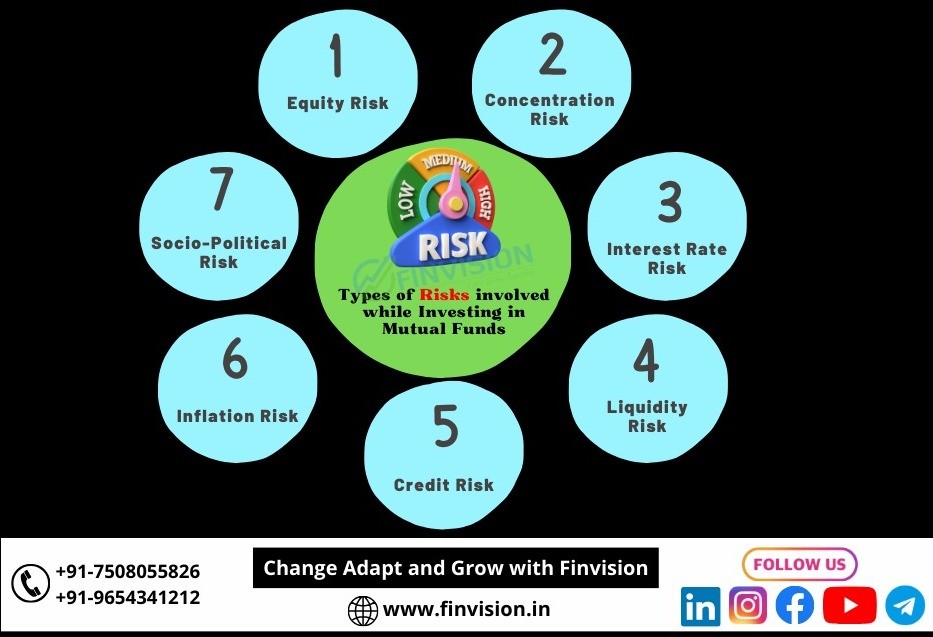Whenever you watch mutual fund advertisements on television, in the end, they show a disclaimer: “Mutual Fund investments are subject to market risks, read all scheme-related documents carefully”.
What does it mean?
What are the market risks that mutual funds carry?
What are the market risks that are associated with equity and debt funds?
People invest to make profits, but “NO investment is risk-free”. And, although mutual funds are comparatively safer and provide diversification as well as value for money to an investor, there are a few risks associated with mutual fund investments. In this blog, we shall discuss some of these risks, but first, let’s understand what really is Market Risk.
‘Market risk’, sometimes also referred to as a systemic risk, is a risk that can result in losses for any investment owing to the market’s bad performance. Several elements influence the market, including Geo-politics, inflation, recession, political instability, natural disasters, interest rate fluctuations, and so forth. Just diversifying one’s portfolio may not assist in these situations, however, it may be hedged in other ways. For eg, almost every stock lost its value in the stock market crash of 2008 and 2020, even though most firms had done nothing wrong or changed their operations in any way. No one and no organization could have foreseen or averted the outcome.
Types of Market Risks: Several market risk components may affect various sorts of investments. Equity risk, interest rate risk, credit risk, inflation risk, socio-political risk, etc., are the most frequent forms of market risk. The sort of market risk that mutual funds face is determined by the assets forming part of their portfolio.


1. Equity Risk: Equity risk applies to the mutual fund portfolios that invest in stocks/equities of companies. By nature, stocks are volatile and fluctuate on account of various market-related activities. For eg, if there is some adverse news or a major shareholder of the company sells his stake, it may result in a fall in stock price. If the mutual fund you hold invests in that company, your mutual fund portfolio value will also decrease due to this event. Equity risk not only applies to equity but also to balanced, hybrid, and all mutual fund schemes that invest in equities.
2. Concentration Risk: Concentrating a significant portion of one’s money in any one stock/asset/sector is generally not the most prudent idea. If you are lucky, you can make a good profit, but your losses may also be noticeable at times. Diversifying your portfolio is a practical approach to reducing this risk. Concentrating and significantly investing in a single industry is not wise. Diversification reduces the risk.
3. Interest Rate Risk: Investments in debt instruments, such as government and corporate bonds, are subject to interest rate risk. RBI controls interest rates. Whenever the RBI raises interest rates, the value of current bonds decreases. Bond funds, money market funds, and balanced funds are affected by this risk.
4. Liquidity Risk: The difficulty in redeeming the investments without experiencing a loss in their value is referred to as liquidity risk. This happens when there are no buyers in the market when a seller is trying to sell his/her investments. The close-ended funds as well as the lock-in period in mutual funds, such as ELSS, can cause liquidity risk as these mutual funds cannot be sold before maturity.
5. Credit Risk: Credit risk implies that the scheme’s issuer will be unable to pay the promised interest. Rating organisations like CRISIL, CARE, ICRA, etc often assess investment agencies based on these factors. As a result, you will notice that a company with a high rating will pay less interest rate for your deposit compared to a company with a lower rating and vice versa. Credit risk also affects mutual funds, particularly debt funds. In debt funds, the fund manager is required to include only investment-grade assets. However, to achieve better returns, the fund manager may incorporate lesser credit-rated assets. This would raise the portfolio’s credit risk. It is important to examine the credit ratings of the portfolio composition before investing in a debt fund. This risk was the major contributor to the 6-Franklin schemes that froze transactions in 2020 and also many others that destroyed investors’ hard-earned capital through segregation & side-pocketing.
6. Inflation Risk: In the case of rising inflation, the value of currency erodes gradually over time. Since the returns of money market funds are less, they are the ones that get affected due to inflation. During high inflation periods, investing in stocks is better than investments in money markets.
7. Socio-Political Risk: Events such as war, acts of terrorism, or political elections may have a negative influence on the market. These risks are referred to as socio-political risks.
Key Takeaway: Investing in mutual funds carries inherent risks due to their diverse portfolio that spans various financial instruments such as stocks, gold, REITs, debt, corporate bonds, and government securities. The values of these assets are subject to fluctuations influenced by numerous factors, potentially leading to both profits and losses. Therefore, accurately assessing the risk profile and selecting the most suitable fund becomes crucial. Seeking guidance from a trusted financial expert before entering any asset class is advisable.
In a world where financial markets can be unpredictable, Finvision Financial Services emerges as a beacon of stability and expertise. With a focus on transparency, personalised service, and a commitment to financial growth, Finvision invites you to embark on a journey of smart and secure investments. Take the first step towards a financially secure future by partnering with #Finvision– where your financial goals become our mission.
Our Coordinates: 011-40044366/ 9654341212 or Email at info@finvision.in












